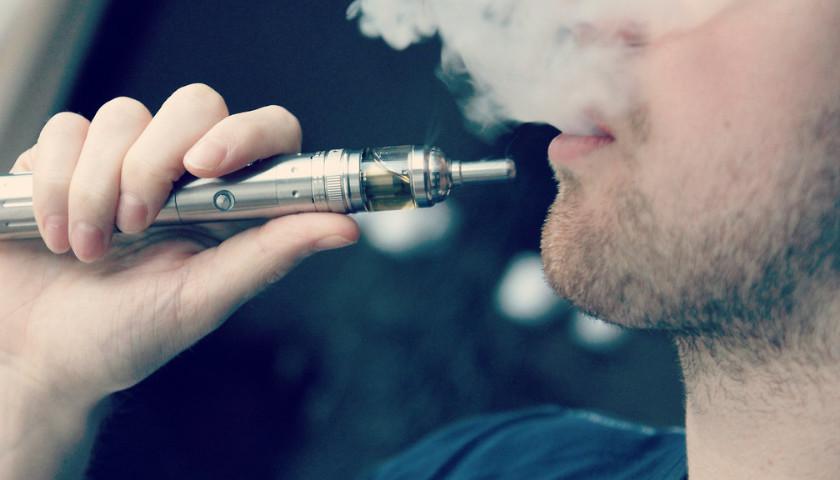Congress and the Trump administration have taken significant steps to rein in the regulatory state and its negative impact on the economy. From executive orders and official policy changes at nearly every agency, much progress has been made in a short period of time. For thousands of small businesses selling products with an innovative solution to America’s greatest public health problem, however, an Obama-era law and its interpretation at the Food and Drug Administration still stands to kill tens of thousands of jobs and harm millions of consumers.
What began as a hobbyist enterprise, the homemade construction of electronic cigarettes and vapor products, has grown into a sophisticated multi-billion industry that is turning the tobacco industry upside down. Far more advanced than their first generation counterparts, vapor products delivery aerosolized nicotine to a user without the harmful effects of tar and smoke. The lack of combustion is precisely why a growing body of evidence and experts have concluded that vapor products are far less harmful than cigarettes.
Unfortunately these acknowledgements run counter to the current regulatory treatment of the products by the FDA. As a result, Congress must act to modernize a law originally intended to regulate traditional tobacco products like cigarettes so that the FDA can devise regulations that actually protect public health without crippling innovation.
In May of 2016, the FDA expanded the definition of “tobacco” products that were subject to premarket review by the agency. The process for bringing new products to market was essentially designed by Congress to prevent just that. This was by design, largely because new cigarette options were unlikely to benefit public health.
Any product that was on the market when the Tobacco Control Act was introduced on February 15 of 2007 was exempt from FDA review, however, ensuring they would remain available forever. That date was called the “predicate date” and it is the date the FDA is now using to determine the legality of vapor products currently on the market. This presents a problem to vapor products because it subjects manufacturers of products that did not exist in 2007 to a cost-prohibitive approval process designed to end in failure.
FDA Commissioner Scott Gottlieb gave the industry a temporary reprieve when he delayed the deadlines for submitting the approval applications until 2021 earlier this year, but unless the pending deadline and the approval process is modernized, products millions of smokers are successfully using to quit smoking will be removed from the market.
This is an issue everyone should be concerned about due to the impact of smoking on public health care costs absorbed by all state taxpayers. In Tennessee, the impact on Medicaid exceeds $824 million annually, according to the Campaign for Tobacco Free Kids. Everyone who pays taxes has a vested interest in driving down the Tennessee smoking rate, which is much higher than the national average, for this reason.
Fortunately the debate over whether this entire industry should be wiped out in 2021 has gained bipartisan attention in Congress. Language in the 2018 Agriculture Appropriations Bill sponsored by Congressmen Sanford Bishop (D-Ga.) and Tom Cole (R-Okla.) would modernize the predicate date and avoid universal prohibition for vapor products. Cole-Bishop would allow the FDA adequate time to roll out good manufacturing practices and product standards that actually protect consumers, instead of simply saying every single one of the hundreds of thousands of types of products on the market must obtain agency approval even if they are already on the market. The latter is simply unworkable, unaffordable, and will result in disaster.
“There would be no way Saffire Vapor could continue to employee 100+ individuals, continue paying rent on 23+ retail locations, and avoid bankruptcy,” unless the predicate date is changed, said Robert Arnold, the company’s Nashville-based CEO in an email.
For the same reason consumers deserve access to other smoking cessation products such as the nicotine patch, lozenge, or gum, it is important that vapor products remain an option for adult smokers trying to quit. That’s precisely why when Congress passes the 2018 budget, updating the predicate date for vapor products should make the cut for language that hits the President’s desk. Jobs and lives are on the line.
– – –
Paul Blair is the Strategic Initiatives Director at Americans for Tax Reform. He can be reached at [email protected] or on Twitter @gopaulblair.






Why can’t they leave the small business alone why do the rich always get richer We fellow Americans are sick and tired of this and Present Trump said he would not allow for small business to be shut down .Dont let the democratic win this. This will affect people who have these business loose their homes and some may even become homeless is this fair I say not. Why don’t we start somewhere ,and stop the regulations . Why continue to only allow for the rich to have accessible to Vabor regulations It not fair and it should be stopped.
Nope, it’s Big Mexico.
The Left wants to bring down Big Tobacco and Big Vaping, only to install Big Marijuana.
Mr. Blair states that “experts have concluded that vapor products are far less harmful than cigarettes”. So, tell me, Mr. Blair, what does less harmful mean, that the user is going to live an average of 2 years longer than a traditional smoker? I am open to hearing arguments but the one that you close with stating saving jobs and lives is confusing. Just how is this going to save lives?
Most people making such statements are relying on the british royal college of physicians two year non private funded study that states they could find no evidence of damage. To cover my their bases the study explains they make and intentional quote of at least 95% harm reduction. Hopefully that satisfies your question
There is a general consensus among researchers globally, that vapor products carry likely only 1% the harm of combustible cigarettes, and almost certainly not more than 5% the harm. These products are dramatically less harmful than smoking, and if states resist their tax grabbing impulse to to impose special and punitive excise taxes on them, the cost of use is lower than smoking too. Think of the billions of dollars that are spent trying to convince people to stop smoking. This is a solution that costs no tax dollars to implement. The free market does the heavy lifting.
A study found that if every US smoker switched to vaping, more than six million lives would be saved in 10 years. https://gumc.georgetown.edu/news/Tobacco_Smokers_Could_Gain_86%20Million_Years_of_Life_if_they_Switch_to_Vaping_Study_Finds
When Paul Blair says vaping is less harmful, he is also referring to the landmark study which found vaping is at least 95 percent less harmful than smoking.
https://www.gov.uk/government/news/e-cigarettes-around-95-less-harmful-than-tobacco-estimates-landmark-review
Can’t wait for them to claim that oxygen is a “drug”…
BIG business and their hired lobbyists at work again! Big tobacco has too much invested to allow some new upstart technology to take market share and reduce revenue. And, BIG government gets too much tax revenue from BIG tobacco. Funny how Obama and the Democrats always blame the Republicans for their ties to big business, yet they do it too! Hopefully, Trump will continue to drain the DC swamp!
There are in the ballpark of a dozen or two dozen products vapor product items made by large tobacco companies. On the other hand, there are literally hundreds of thousands of vapor products made and sold by businesses with absolutely no connection to the cigarette industry. And you claim that these products are all made and sold by cigarette companies? Wrong. They are primarily sold by people that transitioned to these products from smoking, and saw such benefit from it personally, that they wanted to open a business to share this amazing technology with other adult smokers. The vast majority of these small biz owners not only have nothing to do with cigarette makers, they despise them. These businesses aren’t opened by the cigarette industry, they’re opened by the victims of the cigarette industry.
Big PHARMA is the real culprit.
I thought that it was BIG OIL.